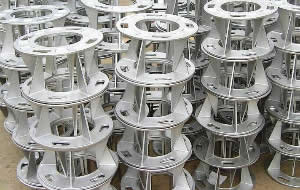Best Practices for Upkeep and Applications in the Aluminum Shop Industry: A Comprehensive Review
Preserving tools in the aluminum foundry industry is essential for operational success. Routine examinations and anticipating upkeep can greatly decrease downtime and improve safety and security. Advanced modern technologies, such as IoT and information analytics, play a crucial duty in this process. Nonetheless, recognizing the complete scope of ideal methods requires a better exam of specific strategies and their effect on performance. What are the necessary parts that add to a reliable maintenance structure?
Significance of Regular Upkeep in Light Weight Aluminum Foundries
Regular maintenance plays an important function in the reliable procedure of light weight aluminum foundries. By systematically evaluating and servicing tools, foundries guarantee peak performance and durability of machinery. Normal upkeep activities, such as lubrication, component, and cleaning replacement, assistance protect against unforeseen breakdowns that can bring about expensive downtime.
Routine checks boost workplace security by identifying possible threats before they intensify into serious problems. Tools that is well-kept runs better, causing boosted item quality and reduced waste. In addition, adherence to a structured maintenance routine can support conformity with industry regulations, thus fostering an online reputation for dependability and top quality within the marketplace.
Implementing Anticipating Upkeep Methods
Predictive maintenance strategies take the concepts of regular maintenance an action better by leveraging data analytics and advanced tracking innovations. In aluminum foundries, these approaches allow drivers to prepare for devices failings prior to they take place, thus reducing unexpected downtimes and maximizing operational effectiveness. By making use of sensing units and IoT tools, real-time information can be gathered on equipment performance, permitting for the recognition of prospective problems with predictive analytics.
Enhancing Melting and Pouring Processes
Efficient melting and putting procedures are essential for taking full advantage of productivity and ensuring the high quality of light weight aluminum castings. To boost these processes, factories need to focus on precise temperature control throughout melting, as this straight affects the metallurgical residential or commercial properties of the alloy. Using innovative melting technologies, such as induction and resistance melting, can enhance power efficiency and decrease cycle times.
Implementing automated putting systems reduces human mistake and preserves consistency in the pouring process. Proper mold and mildew prep work, consisting of appropriate preheating, is essential to avoid thermal shock and improve mold and mildew long life.

Enhancing Safety Methods in Shop Procedures
Prioritizing safety and security in light weight aluminum foundry procedures is essential for protecting employees and guaranteeing an efficient atmosphere. Effective safety and security procedures include regular training sessions that highlight the importance of individual resource protective devices (PPE), such as goggles, gloves, and safety helmets. Furthermore, the facility of clear emergency situation procedures is vital in taking care of possible accidents.
Routine examinations of equipment and machinery assistance identify dangers prior to they escalate into serious issues. Executing a robust reporting system urges employees to interact security directory concerns without fear of repercussion. Promoting a culture of safety warranties that every worker recognizes their function in maintaining a safe and secure workplace.
On top of that, assuring appropriate ventilation and surveillance air top quality can mitigate exposure to dangerous fumes and dust. By strengthening these methods, aluminum factories can substantially reduce the danger of crashes and produce a setting where workers really feel valued and safe, eventually boosting total functional efficiency.
Leveraging Modern Technology for Improved Performance
Utilizing innovative technology has become progressively important for aluminum factories intending to enhance functional performance. Automation and robotics play a crucial function in streamlining production procedures, reducing labor prices, and lessening human mistake. Carrying out real-time surveillance systems permits for the constant analysis of devices efficiency, allowing proactive upkeep and decreasing downtime.
In addition, the assimilation of data analytics gives important insights into functional operations, promoting far better decision-making and source allowance. Anticipating analytics can determine potential failings prior to they occur, more maximizing maintenance schedules.
Additionally, embracing advanced melting and casting modern technologies boosts power effectiveness and material return, which are fundamental for sustainability in the industry. By embracing these technical developments, aluminum shops can not only enhance efficiency yet additionally preserve a competitive side in an increasingly demanding market (Casting Foundry). Inevitably, leveraging modern technology is critical in driving development and improving total functional efficiency within the sector

Often Asked Questions
What Are Common Indicators of Equipment Put On in Aluminum Foundries?
Common signs of equipment wear in aluminum foundries consist of unusual sounds, reduced performance, increased vibration, overheating elements, leakages, and visible rust. These signs commonly signal the demand for upkeep or possible substitute to prevent pricey downtime.
Just How Can I Train Personnel for Effective Upkeep Practices?
To train staff for efficient maintenance techniques, one can apply hands-on workshops, establish detailed handbooks, encourage mentorship programs, and carry out routine evaluations to review abilities and understanding, guaranteeing all workers comprehend maintenance methods completely.
What Are the Ecological Laws for Aluminum Foundries?
Light weight aluminum foundries are subject to various environmental click to read laws, consisting of discharges control, waste administration, and resource conservation. Conformity warranties minimal environmental impact, promoting sustainability while sticking to neighborhood, nationwide, and global ecological criteria and laws.
Just How Do Foundries Manage Waste and Recycling of Light weight aluminum?
Foundries take care of waste and recycling by executing systems for accumulating scrap aluminum, utilizing innovative splitting up innovations, and teaming up with recycling centers to assure efficient recovery procedures, consequently decreasing ecological influence and promoting sustainability within the market.
What Are the Costs Related To Implementing Advanced Technologies?
Applying innovative modern technologies in factories sustains substantial expenses, including preliminary financial investment, training, and maintenance expenditures. The long-term advantages, such as enhanced performance and decreased waste, typically validate these expenses, leading to boosted productivity. (aluminum foundry)
